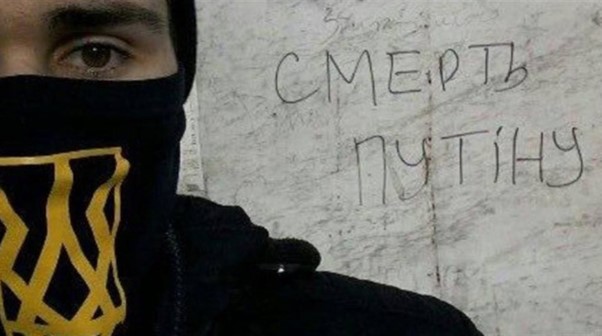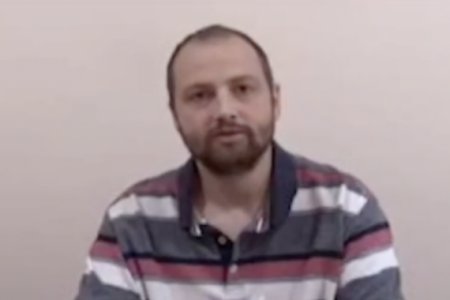
Russia’s Southern District Military Court in Rostov has imposed a massive fine against 27-year-old Oleksandr Plysiuk from occupied Melitopol (Zaporizhzhia oblast) over a social media post from 2017. Although the prosecution was surreal and legally nihilistic, Plysiuk had been in detention since March 2024, and the sentence could have been worse.
The Russian Telegram channel ASTRA first reported that Plysiuk had been detained on 13 March 2024, with the formal charge over the 2017 social media post of ‘public calls to terrorist activities’ (Article 205.2 § 2 of Russia’s criminal code). The post was a selfie, with the young man in a black mask with the Ukrainian Trident against a background on which the words are written (in Ukrainian) ‘Death to Putin’. It was presumably the words that the Russian-installed FSB [security service] and so-called ‘centre for countering extremism’ in occupied parts of Zaporizhzhia oblast chose to view as ‘public calls to terrorist activities’.
Not only had the post been published five years before Russia’s full-scale invasion of Ukraine and seizure of Melitopol, but it was also on a VKontakte page which Plysiuk had not updated since 2019 and may well have forgotten about. ASTRA also noted that Plysiuk was already in detention when the criminal charges were laid. It is known that this was in connection with administrative charges under Article 20.5.1 § 1 – ‘infringement of martial law rules, but not how, precisely, he was supposed to have infringed them. He had clearly not been released, and since the ‘trial’ took place in Rostov (Russia), it is possible that he was taken from occupied Melitopol to a SIZO [remand prison] in Russia.
Memorial reported on 22 October 2024 that Plysiuk had been convicted with the Southern District Military Court imposing a massive 700 thousand rouble fine, but at least ordering his release from detention.
A Memorial representative was present at the hearing on 15 October, and reported on the proceedings. The prosecution had clearly tried to claim that Plysiuk was a member of what it calls “the terrorist organization ‘Azov’. If this was supposed to make up for criminal charges over a social media post from 2017, it did not. There were no valid grounds for the politically servile Russian supreme court’s ruling on 2 August 2022 which declared the Azov Regiment, part of the Ukrainian Armed Forces, ‘terrorist’. The move was clearly understood then, and has proven since, to be aimed at providing a pretext for grotesque ‘trials’, especially of Ukrainian prisoners of war. As an additional excuse for the charges against Oleksandr Plysiuk, the attempt was equally absurd. Of the ‘witnesses’ called by the prosecution, only Oleksandr’s mother, Natalia, appeared in court, and stated that she knew nothing of any supposed involvement by her son in ‘Azov’, nor of any publications about the killing of Russian leader Vladimir Putin. The only other ‘witnesses’ claimed to be unable to attend, with their ‘testimony’ given under earlier interrogation read out in court, as was Plysiuk’s. The two ‘damning statements’ were almost word-for-word identical, although they essentially only ‘accused’ the 27-year-old Ukrainian, living in occupied Ukraine, of pro-Ukrainian views and opposition to the Russian Federation. While possible that the FSB found two collaborators, eager to serve the occupation regime, it is just as likely that Oleksandr’s former partner and the two people who claimed to have known the young man from childhood were tortured and / or threatened into providing their ‘testimony’. The same applies to Plysiuk himself and any ‘confession’ and willingness ‘to reform’ that he gave.
The ‘testimony’, as well as the thought crime charges themselves, were all disturbingly reminiscent of Soviet-style persecution. Other features, however, are also evident that have become standard of the current Russian regime’s propaganda narrative, as well, probably, as the torture it uses to ensure that this narrative is repeated. While prosecuting Ukrainians from occupied territory for supporting Ukraine’s Armed Forces, helping the Ukrainian Security Service, etc., the FSB invariably tries to present any such support as having been for mercantile reasons. Here too, in court, a scene was played out in which the prosecutor ‘asks’ Plysiuk if he still supports Azov and is told that the latter “supported it because they could receive financial remuneration, but stopped when I got work…”
The fact that Plysiuk was arrested and spent over seven months in captivity, as well as the final addresses from prosecutor, defence lawyer and Plysiuk himself all seem part of a propaganda exercise in sending a chilling warning to other Ukrainians on occupied territory of what to expect for pro-Ukrainian views.


